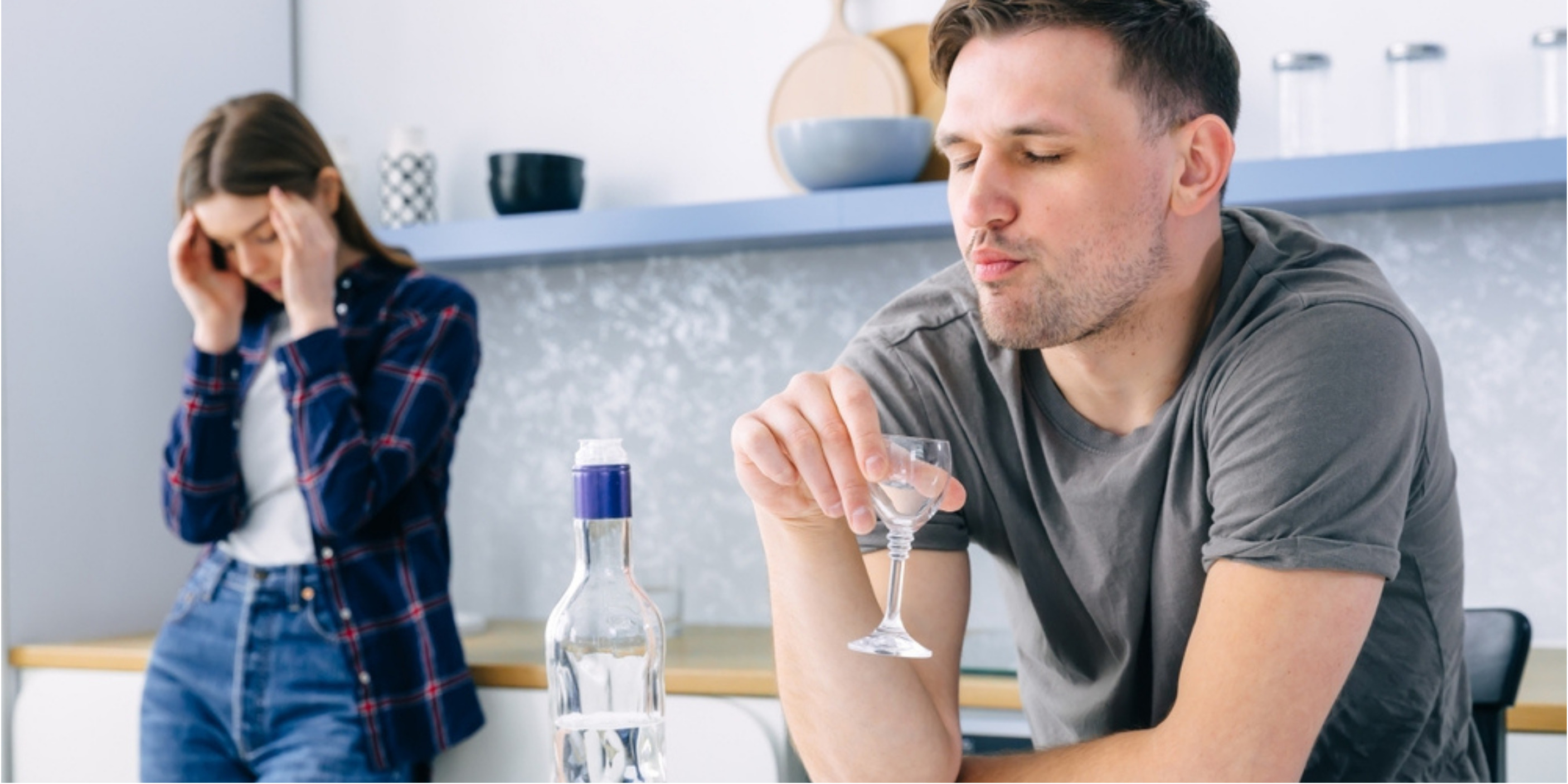Last Updated:
July 29th, 2025
Across households, between countries and around the world, people’s lives are affected in myriad ways by their relationship with an alcoholic. Reports show us that over half of UK adults have had a family member or partner with a drinking problem, while almost one in four (23%) worry about their partner or ex-partner’s drinking.
For people out there living with an alcoholic partner, we want you to know that you shouldn’t struggle alone and help is out there.
We’ll give you steps to make sure you navigate the tempest of addiction with compassion and strength, for your partner’s brighter tomorrow.
How many people are affected by alcoholic partners?
According to statistics from the NHS, as many as 24% of adults in the UK drink more than the recommended 14 units per week. Yet alcoholism will rarely ever only affect the person with the addiction. Alcoholism has a notorious propensity to rip through families and bleed into the personal relationships in an alcoholic’s life.
One report from ScienceDaily suggests that one in five people in England are regularly harmed by others’ drinking. Living with an alcoholic partner can lead to anxiety, hypervigilance, resentment, or sheer emotional exhaustion.
Despite carrying such a heavy toll, partners are often overlooked in support systems. It might not always feel like help is available to you, but please remember, help exists and you are not alone in your suffering.
What are the signs that my partner is struggling with alcoholism?
Deep alcoholism will usually develop gradually, so you may already be noticing signs of its dark effects in your partner. However, there may be more subtle changes that you can vaguely sense, but can’t quite put your finger on.
Recognising signs at the right time can be the difference between getting help when you need it and fighting a lost battle. Here are some of the common signs that they’re struggling:
Drinking for a new purpose, reason, or occasion
Your partner may have previously enjoyed drinking only socially, but now they reach for alcohol as a new, strange response to an external stimulus. You might have noticed unusual comments about alcohol as a way to “celebrate” something small, which troubles you. You might see them drinking as a way to cope with conflict or boredom, or it might start replacing healthier activities they used to enjoy, like exercising or visiting loved ones.
Alcoholism symptoms appear physically
As a more overt signal that alcoholism is taking a toll on your partner, dependency will often show up in the body, given enough time. You may notice:
- Bloodshot eyes
- Shaking hands
- Unexplained bruises or frequent “accidents”
- Worsening hygiene and rapid weight changes
Understandably, not all signs indicate that alcoholism is the problem, but if they’re recurring alongside other signs, it may be a cause for concern.
Drinking takes precedence over other commitments
As alcoholism deepens, drinking will slowly take higher priority over other activities. Your partner may start cancelling plans, getting to work late, or neglecting the responsibilities that you feel should be shared. Sadly, it will feel like they choose alcohol over time with you, or they might choose to drink before they spend meaningful time with you, which can hurt.
Sobriety becomes a state of hostility or disdain
You might hear your partner mock or criticise people who don’t drink, or they may appear to grow more short-tempered when sober. You might feel like your partner is only “fun” or “relaxed” when they’ve had a drink, which can be a dangerous key to opening the door to enabling.
How can I open the conversation and get them help for alcoholism?
Approaching your partner about their drinking will feel daunting, but silence will most likely worsen the situation, eventually. The goal for your conversation should not be to criticise or control, but to open your heart and show them the amount of concern you have. Choose a time when they’re sober and the environment is calm.
Here are tips to keep the sensitive conversation guided:
- Use “I” statements to avoid sounding accusatory (e.g., “I’ve noticed…”).
- Focus on the impact their drinking has on you and others.
- Stay calm and non-confrontational.
- Offer specific help, like going with them to an appointment.
- Be prepared for resistance, but don’t give up after one try.
What if I’m met with denial or anger?
No matter how much you exhaust yourself, there is still a possibility that your partner responds with anger or complete denial of the truth. You need to make space for this, as frustrating as it may be.
An alcoholic person can easily swing day-to-day in their mood, their energy and their ability to truly listen. As long as you have opened your heart and completely spoken the way you feel, you may take small solace in the fact that you are (and have been) there for them.
Give them space, let them know you’ll revisit the conversation and protect your own emotional wellbeing. In the end, their reactions, as well as their health, are not your responsibility.
How can I support myself through the process?
If you’re struggling to take care of yourself as you repeatedly show up and care for your partner, here are some steps to make sure you’re staying afloat amidst the emotional storm:
You may want to make sure your partner doesn’t feel shut out or locked out by the line you place in the sand, that the door remains open, but you are in control. Boundaries may eventually become a lifeline for maintaining your wellbeing.
Where can I find support to help my addicted partner?
If your partner is showing signs of alcohol addiction, remember that you shouldn’t struggle alone. Starting the conversation can feel uncomfortable, but it might be the turning point your relationship needs. With the right support, recovery is possible, both for them and for you.
At Banbury Lodge, we specialise in substance and alcohol detox treatment that helps your loved one withdraw as safely as possible. Our expert staff give round-the-clock care to help manage alcohol withdrawal symptoms and make sure you’re on track for sustained sobriety.
Don’t wait until it’s too late. Contact us today to take the first step toward a healthier, sober life, free from the shackles of addiction.
(Click here to see works cited)
- “Press Release: Is Your Drinking Putting Your Health and Relationships at Risk?” Alcohol Change UK, alcoholchange.org.uk/blog/press-release-is-your-drinking-putting-your-health-and-relationships-at-risk
- “Does Alcohol Make You Argue with Your Partner?” Drinkaware, www.drinkaware.co.uk/advice-and-support/help-to-reduce-drinking/alcohol-in-the-home/does-alcohol-make-you-argue-with-your-partner
- Health Survey for England, 2022 Part 1, digital.nhs.uk/data-and-information/publications/statistical/health-survey-for-england/2022-part-1/adult-drinking
- “One in Five People in England Harmed by Others’ Drinking over Past Year.” ScienceDaily, ScienceDaily, 9 May 2019, www.sciencedaily.com/releases/2019/05/190509193342.htm.





